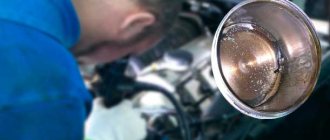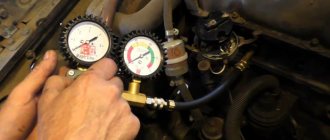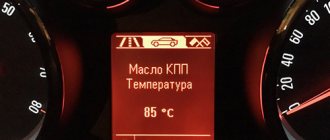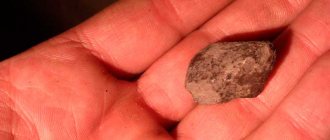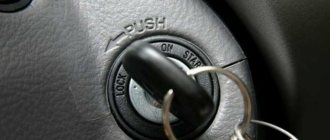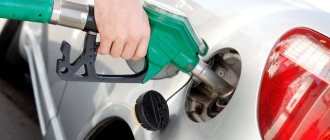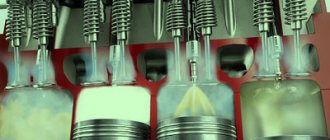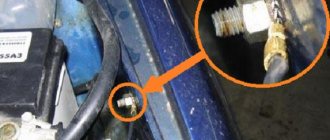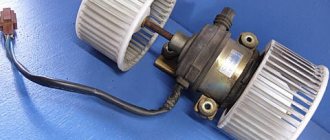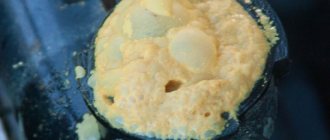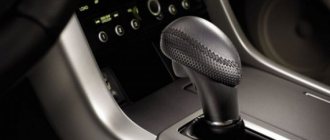Diesel engines are almost always noisier than their gasoline counterparts. The ringing of detonation, the rattling sound emitted from a running engine - all this is typical for the operation of a diesel engine. This noise is caused by the compression of air in the cylinders and the ignition of fuel as it is introduced into the cylinder. At the same time, the rattling would be the same in a gasoline engine with such a malfunction as early ignition. The timing of fuel injection into a diesel engine is critical to prevent some parts from breaking down.
The thing is that a diesel engine works differently than its gasoline counterpart. In a gasoline engine, fuel is mixed with air and then compressed before an electric spark ignites the mixture. In a diesel engine, only air is compressed. The fuel is then injected into the compressed air cylinder and the heat from the compressed air ignites the fuel without the aid of an electrical ignition.
The rattling sound of a running diesel engine is the sound of the fuel injection process. Injecting cold diesel fuel into extremely hot compressed air causes the fuel to ignite while the piston is still rising to top dead center in the cylinder, resulting in detonation and a subsequent rattling sound, which is characterized as rattling. The compression ratio typically affects how loud a diesel engine rumbles—the higher the compression ratio in a cylinder, the louder it runs.
While gasoline engines typically operate in compression ratio ranges from 8:1 to 10:1, a typical diesel engine operates in compression ratio levels from 14:1 to 25:1. This higher compression ratio allows the diesel engine to operate more efficiently than its gasoline cousin. Thus, a diesel engine rattles because it is a byproduct of the increased compression ratio, or more accurately, the fuel injection process.
By the way, the diesel engine has the design property of being difficult to start in cold weather due to the lack of an electronic ignition system. To combat this, many manufacturers equip diesel engines with glow plugs to make starting easier in cold climates. Glow plugs use the car's battery to heat a wire coil in the combustion chambers. This causes more noticeable detonation in the engine until it reaches operating temperature. Therefore, an unheated diesel engine can rumble even louder. This knock decreases as the diesel engine warms up.
Some manufacturers even create special engine mounts that help muffle diesel rattling so that the sound is less audible inside the car.
Diesel engine noises indicating a malfunction
Every fan knows the sound of his car's engine. As a rule, it is quiet and measured, without any admixture of extraneous noise. However, the appearance of extraneous sounds, and especially knocking, gives many vehicle owners cause for concern. The reasons for knocking can be very diverse. Some indicate the need for scheduled maintenance, others indicate serious malfunctions and the need for urgent repairs of the diesel engine.
Among all kinds of engine problems, knocking noise when running a diesel engine is the most common occurrence. It is important to distinguish engine noise from the sound of the chassis. It is impossible to determine in absentia the cause of the knocking without conducting engine diagnostics, since many elements of the system can produce similar noises. Knocking can occur either from an insufficiently tightened part or from a failed motor element. In any case, you should not postpone your visit to the car service center.
Knocking in a diesel engine: solutions
Among the various malfunctions of diesel cars, there is the problem of knocking in the engine. Of course, it is impossible to determine “by eye” what exactly is the cause of the knocking, since many components can make such sounds. This could be either a simply loose part or an element that has failed. In this case, you should not delay and visit a service station as soon as possible, but in any case, diesel engine repair begins with diagnostics. Let us give an example of the most obvious causes of knocking in a diesel engine.
Crankshaft
Crankshaft knocking may occur due to the formation of large gaps in the main or connecting rod bearings, which may appear due to wear of the crankshaft journals or bearings. So, a gap of 0.020-0.040 millimeters can be considered normal. The following factors can also cause an increased gap:
- Low quality oil
- Lack of lubrication on bearings
- The presence of some antifreeze or water in the oil
- Excessive ovality of the crankshaft journals, etc.
Having confirmed one of the reasons, it is recommended to contact specialists to carry out repairs and restore proper operation of the crankshaft.
Camshaft
As a rule, such a knock is dull and occurs when starting a cold engine. When oil reaches the bearings, this knocking noise usually stops. The reason here is wear of the shaft bearings, which can occur due to the appearance of mechanical impurities in the oil, scratches on the shaft, or a small volume of oil supplied to the bearings. If the problem is left unattended, bearing wear will increase, which will lead to knocking even when starting a warm engine.
Other causes of diesel knocking
The fuel injection pump can also knock in a diesel engine, but diagnostics of this unit should be carried out by professionals at a special stand to ensure correct repairs. A knocking noise can also occur because the piston reaches the valves if there is a failure in the valve timing. Finally, the piston may also knock on the head due to its unacceptable proximity to the piston. This often happens due to an incorrectly adjusted thickness of the gasket that is placed under the head. If the thickness is less than required, it is strongly squeezed out and, as a result, the head comes into contact with the piston, causing a characteristic knocking sound.
Read more:
What to do if the idle speed of a diesel engine is floating?
Knock Characteristics
Extraneous sounds produced in the power plant are divided according to four main criteria:
- Force;
- Sound;
- Cyclicality;
- Cause and effect of noise.
The strength of the knock can be subtle, medium or loud. If the knock is weak, you can continue to drive the car, but it’s still worth going to a car service center for diagnostics. If the knocking is of medium intensity, then the machine should be parked as soon as possible for diagnostic work and scheduled maintenance.
If loud, distinct knocking noises appear inside the engine, you should immediately stop using the car, since all signs indicate significant problems in the operation of the engine. It is best to deliver such a car to a car service using a tow truck or tow truck.
Like strength, the sound of a knock can be different: ringing (metallic) and dull. A loud knock indicates the contact of two hard elements without an oil layer, and a dull knock indicates the impact of parts, one of which is soft, and at the same time there is an oil layer.
The cyclical characteristics of the impact make it possible to determine the degree of need for urgent repairs. So, a spontaneous knock or knock that occurs without a system may be the beginning of problems with the motor, or it may be the cause of attachments (for example, a loose generator). If the knocking is regular, then you should immediately seek the services of specialists.
Causes of diesel engine knocking
The knock itself is a consequence of one element hitting another. The most common causes of diesel knocking are as follows:
Camshaft knocking
A distinctive feature of camshaft problems is the dull knock of a diesel engine when cold. After the engine warms up, oil flows to the bearings and the knocking goes away. In this case, we can talk about significant wear of the shaft bearings. It is caused by the presence of various impurities in the engine oil, which during operation lead to scratches on the shaft. If this problem is not eliminated, then in the future the knocking will spread to the warmed-up engine.
Crankshaft knocking
Crankshaft knocking occurs due to wear of the journals or bearings and an increase in the distance in the bearings. This leads to a decrease in the quality of engine oil and a lack of lubricating fluid on the bearings, as well as water or antifreeze getting into the oil and deformation of the crankshaft journals.
Faulty injector, jammed needle in the nozzle, as well as malfunction of the high pressure fuel pump (HPF)
The knocking of the plunger (a cylindrical piston with a length exceeding its diameter) of the injection pump is caused by the low quality of diesel fuel, and diesel knocking is possible at idle speed and when adding speed. In addition, noise from the fuel pump can appear completely unexpectedly while driving.
Distribution phase failure
As a rule, this “clinical picture” appears when the length of the piston is insufficient to reach the valves. This causes malfunctions and, as a result, a characteristic knock.
Knock of diesel injectors
The “proprietary” source of knocking from a diesel engine can be injectors. The diesel injector is one of the main elements of the diesel engine power supply system. The nozzle (injector) provides direct supply of diesel fuel into the diesel combustion chamber, as well as dosing of the supplied fuel at a high frequency (more than 2 thousand pulses per minute). The injector effectively sprays fuel in the space above the piston. As a result of this spray, the fuel takes the form of a torch. Injectors of fuel supply systems that differ from each other have design features and differ in the control method. Injectors are divided into two groups: mechanical and electromechanical.
The knocking sound of a diesel injector is usually very noticeable and sounds like a chattering or clicking noise coming from the top of the engine. The knock comes literally from under the decorative (noise-proof) engine cover, if present. You can also recognize the clicking sound of an injector by grabbing its fuel line. After touching the fuel line, a vibrating knock “coming” from the engine will be felt.
The connecting rods or crankshaft are knocking in the diesel engine
Knocking connecting rods is a sign of serious damage, which means the need for a major overhaul of the diesel engine. This “crank knock” of a diesel engine differs from a similar malfunction of a gasoline engine.
Pistons in diesel units come almost close to the cylinder head during reciprocating motion. The appearance of a knock means that the gap in the connecting rod journal of the crankshaft has increased, as a result of which the top of the piston slightly “sticks” into the cylinder head. The second cause of knocking may be a loose connecting rod nut. By its nature, the sound resembles dull metallic knocks, which also occur when the timing belt is incorrectly aligned and has slipped by one “tooth.”
It will not be possible to diagnose a malfunction by turning off the power to each cylinder one by one (used when diagnosing similar malfunctions on gasoline units). The crankshaft will still rotate and the piston will continue to touch the cylinder head. Driving a diesel engine with a knocking rod is strictly prohibited. The car must be delivered to the service by tow or tow truck for boring the crankshaft, replacing bearings, etc.
The knocking noise of a diesel crankshaft is most pronounced when it is cold, when the engine oil has not yet had time to fully reach the bearings through the oil channels. As the engine warms up, the problem is masked a little; the crankshaft may knock less intensely at certain speeds. On a cold engine, the sound is metallic, rhythmic and muffled at idle. As the speed increases, the rhythm increases and the knock becomes louder.
The crankshaft may knock due to too large gaps that appear in the main or connecting rod bearings. The crankshaft begins to knock as a result of worn journals and/or bearings.
How to identify a knocking injector
To check which injectors are knocking, you need to do the following. One by one, starting from the first cylinder, you need to unscrew the fuel pipe going to the injector and screw in a plug instead of the injector (if the diesel is Common Rail) or if you have a spare injector and put it in a plastic bottle. Then we start the diesel engine: it will run on the remaining cylinders with unnecessary vibrations. And if the knocking noise from the injector disappears, then you managed to find the knocking injector. In the same way, you can check even a couple of injectors at once, since the diesel engine can start even on two cylinders.
Causes of knocking diesel injectors
The injector may knock if there is an increased portion of fuel supplied to the cylinder due to misaligned fuel equipment; a characteristic knock occurs when the engine is running. In this case, by alternately unscrewing or loosening the fittings from the injectors, we determine in which cylinder hard combustion occurs. If, when unscrewing slowly, when part of the fuel seeps through the fitting, and the rest enters the cylinder through the nozzle, the operation and knocking are normalized, we can safely talk about an excessive portion of fuel. This method works on older diesel engines.
Detonation knocks
Early fuel injection on diesel engines causes detonation combustion of the working fuel-air mixture. Detonation leads to knocking, rough and harsh operation of the diesel engine. The concept of detonation refers to a disruption of the normal combustion process of diesel fuel in the combustion chamber.
Detonation does not mean combustion of fuel, but an explosion. The entire portion of the fuel mixture burns instantly. The pressure on the piston, which has not yet reached top dead center, increases sharply. Also, as a result of detonation, a shock wave is formed, which is reflected from the piston, destroying the piston itself and the rings.
We also recommend reading the article about the design of diesel fuel injectors. From this article you can learn about the design features and types of injectors that are used in diesel engine power systems.
Explosions in the cylinders cause the characteristic knocking sounds of a diesel engine. The main signs of detonation in a diesel engine are metallic (relatively loud) knocking in the cylinders, the engine is shaking, the cylinder head is overheating, and power is reduced. Another reason for diesel detonation may be a malfunction of diesel injectors or fuel injection pump (high pressure fuel pump). Excessive leanness of the mixture leads to similar explosions in the combustion chamber.
Nozzle wear
The injector nozzles have the fifth class of manufacturing accuracy. Such a precise detail completely eliminates the ingress of dirt and water. The sprayer is lubricated with diesel fuel. Damage to the working edge of the nozzle significantly impairs the quality of fuel atomization and distorts the direction of injection. Contrary to popular belief, injectors damaged by low-quality diesel fuel cannot be washed or cleaned. The malfunction can only be eliminated by replacing the nozzle. A knocking noise is one of the symptoms of a worn injector nozzle.
Nozzle knocking is an early and very sure sign indicating the need to replace the nozzles. Sometimes adjusting the injection pressure helps for a short time (during operation and wear of the nozzle, the pressure naturally decreases). The reason for what is happening is as follows: in worn nozzles, the needle sealing band is significantly larger than in a new one, and therefore, with the same spring force, the specific pressure on the sealing band is less and the sprayer does not seal, i.e. the slightest disturbance (be it air or varnish deposits) is enough for it to stop spraying fuel. The motor reacts to this with a knock. Just don’t think that the decreased specific pressure can be compensated for by tightening the spring more tightly. This will be an interference in the operating conditions of the fuel injection pump and in the engine’s operating process, and it’s easy to mess things up here. Sometimes a good wash of the needle and cavity of the nozzles to remove varnish deposits helps, but, firstly, this must be done with some preparation, and secondly, take into account that nozzles are now not that expensive and replacing them is also not a terrible operation. And also the fact that driving on pouring nozzles definitely leads to cracking or burning out of the cylinder head, and in some engines, pistons, so it makes sense to approach this problem carefully.
You can choose diesel electric injectors and many others for your car on our website
Diesel engine camshaft knocking
The diesel camshaft has a muffled knock, which varies at the initial stage when starting a cold engine. The rhythmicity of the camshaft knock is exactly two times less in frequency compared to the same frequency of crankshaft knocks. The moment the engine oil reaches the bearings, the knocking noise disappears. This usually takes about 3 seconds.
The reason for this camshaft knocking noise is its worn bearings. The causes of wear are similar in nature to the factors that lead to knocking of the crankshaft of a diesel engine: lack of lubrication, dirty engine oil, insufficient pressure in the lubrication system, scratches on the camshaft. As wear increases, the camshaft will also knock on a warm diesel engine.
The point is that the knocking camshaft will move a little. Shifting the shaft up and down will lead to the formation of wear in the area of operation of the hydraulic compensator and the parts associated with it, and the clearances will be disrupted. The result will be that the hydraulic compensator will open the valve slightly without the proper clearance.
The result will be a drop in compression, difficulties will arise with starting the internal combustion engine, the diesel engine will lose power, and diesel fuel consumption will increase. Low compression will lower the temperature in the cylinders, the engine will operate unstably, which will cause active carbon formation and local overheating, and can also lead to burnout of the piston and valves.
Timing valves may knock as a result of increased clearances. On engines with hydraulic compensators, knocking can also be caused by wear of the compensators themselves or result from their insufficient filling with engine oil. The knock is loud, the frequency of the knock is similar to the knock of the camshaft. If the valve timing is not set, then the piston may reach the valve.
